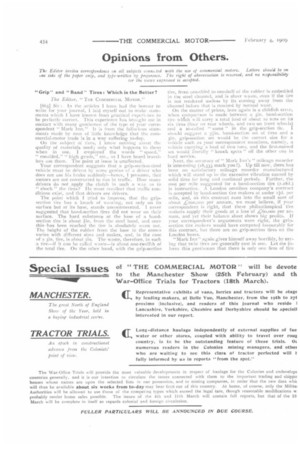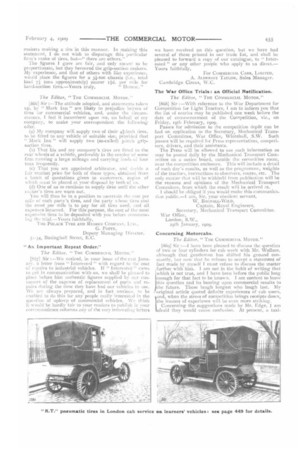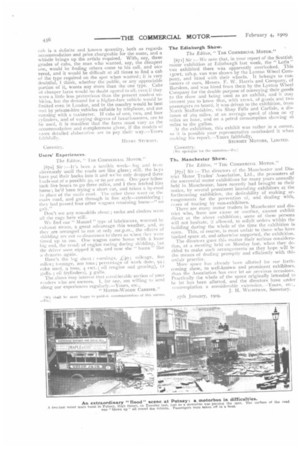Opinions from Others.
Page 18

Page 19

Page 20

If you've noticed an error in this article please click here to report it so we can fix it.
The Editor invites correspondence on all subjects conne.ted with the use of commercial motors. Letters should be an one side of the paper only, and type-written by prejerence. The right of uboreviation is reserved, and no responsibility tor the views expressed is accepted.
" Grip" and "Band " Tires : Which is the Better
The Editor: " THE COMMERCIAL MOTOR."
[865] Sir : In the articles I have had the honour to write for your journal, I laid myself out to make statements which I have known from practical experit nee to be perfectly correct. This experience has brought inc in contact with many gentlemen of the type of your correspondent " Mark Inn." It is from the fallacious statements made by men of litde knowledge that the commercial-motor trade is in a way suffering to-day.
On the subject of tires, I know nothing abut the quality of materials used; only what happens to them when in use. I employed the words " spued," moulded," " high grade," etc., as I have heard travellers use them. The point at issue is unaffected.
Your correspondent suggests that a grip-section-tired vehicle must be driven by some genius of a driver who does not use his brake suddenly—hence, I presume, that motors are not constructed to run in traffic. flow many drivers do not apply the clutch in such a way as to " shock " the tires? He must recollect that traffic conditions exist, and that drivers are drivers.
The point which I tried to impress, that the gripsection tire has a knack of wearing-, not only on its surface but at its base, stands uncontroverted. I never suggested that band-section tires did not wear on their surface. The hard substance at the base of a bandsection tire is about lin. from the steel band, and once this has been reached the tire is absolutely wern out. The height of the rubber from the base to the crown varies with different sizes and makes, and, in the case of is 5in, tire, is about sin. The waste, therefore, in such a tire—if it can he called waste—is about one-twelfth of the total tire. On the other hand, with the grip-section
tire, from one-third to one-half of the rubber is embedded in the steel channel, and is sheer wa.:Ae, even if the time is not rendered useless by its coining away from the channel before that is reached by normal wear.
On the matter of prices, here again is a childish error, when comparison is made between a sin. band-section tire which will carry a total load of about to tens on its six tires (four on rear wheels, and two on front wheels) and a so-called " same " in the grip-section tic. I should suggest a 3"fin, hand-section set of tires and a sin. grip-section set would be the correct size for a vehicle such as your correspondent mentions, namely, a vehicle carrying a load of two tons, and the first-named set would literally " knock spots " off the other one in hard service.
Next, the accuracy of " Mark Inn's " mileage recorder is interesting (i8,333 mark you!). Up till now, there has been no satisfactory mileage recorder manufactured which will stand up to the excessive vibration caused by solid tires for long and continual periods. Further, the cost per mile suggestedfor a band-section tire (2.28d.) is instructive. London omnibus company's contract is accepted by band-section tire makers at under rid. per mile, and, as this contract runs into the small sum of about ete-zoo,orto per annum, we must believe, if your correspondent is right, that these philanthropical tire makers supply their goods at a loss of eC,6o,(x)o per annum, and yet their balance sheet shows big profits. If your correspondent's arguments were right, the gripsection tire makers would have competed favourably for this contract, but there are no grip-section tires on the London buses, "Mark Inn" again gives himself away horribly, by saying that twin tires are generally cast in one. Let me inform thin gentleman that there is only one firm of tire
makers making a tire in this manner. In making this statement, I do not wish to disparage this particular firm's make of tires, but—" there are others."
The figures I gave are fair, and only meant to be proportionate, but they favoured the grip-section makers. My experience, and that of others with like experience, would place the figures for a 3-1-ton chassis (i.e., total load 7eli tons approximately) nearer tAct. per mile for
band-section tires.—Yours truly, " IIoNtoc."
The Editor, "THE COMMERCIAL Moioa."
[866] Sir :—The attitude adopted, and statements taken up, by " Mark Inn " are likely to prejudice buyers of tires for commercial vehicles, and, under the circumstances, I feel it incumbent upon me, on behak of my company, to make your correspondent the following offer.
(a) My company will supply two of their 4-inch tires, to be fitted to any vehicle of suitable size, provided that " Mark Inn " will supply two (so-called) 5-inch gripsection tires.
(b) That his and my company's tires are fitted to the rear wheels of a vehicle, preferably in the employ of Some firm running a large mileage and carrying toads of four tons frequently.
(c) That you are appointed arbitrator, and decide a fair market price for both of these types, obtained from a hatch of quotations given to customers, copies of which must be placed at 'our disposal by both of us.
(d) One of us to continue to supply tires until the other maker's tires are worn out.
You will then be in a position to ascertain the cost per mile of each party's tires, and the party \\ hose tires cost the most per mile is to pay for all tires used, and all expenses incurred. For this purpose, the cost of the most expensive tires to be deposited with you before commenrkig the trial.—Yours faithfully,
THE POLACK TYRE AND RURBER COMPANY, Ul
G. POPPE, Deputy Managing Director. 31-34, Basingthall Street, E.G.
"Aix Important Repeat Order."
The Editor, " THE COMMERCIAL MOTOR."
[857] Sir :—We noticed, in your issue of the 21St January, a letter from " Interested " with regard to lhe cost of repairs to industrial vehicles. If " Interested " cares to get in communication with us, we shall be pleased to place before him authentic figures supplied by our customers of the expense of replacement of parts and repairs during the time they have had our vehicles ia use. We are always prepared, and in fact anxious, to be enabled to do this for any people really interested in the question of upkeep of commercial vehicles. Wo think it would be hardly fair to your readers to publish In your correspondence columns any of the very interesting letters
we have received on this question, but we have had several of these printed in our trade list, and shall be pleased to forward a copy of our catalogue, to " Interested " or any other people who apply to us direct.— Yours faithfully, For COMMERCIAL CARS, LIMITED, A. ArueustKY TaYe0E, Sales Manager. Cambridge Circus, \V. C.
The War Office Trials: an Official Notification.
The Editor, " THE COMMERCIAL MOTOR."
[86SI Sir :—With reference to the War Department for Competition for Light Tractors, I am to inform you that the list of entries may be published one week before the date of commencement of the Competition, viz., on Friday, 19th February, 1909. Passes for admission to the competition depat can be had on application to the Secretary, Mechanical Transport Committee, War Office, Whitehall, S.W. Such passes will be required for Press representatives, competitors, drivers, and their assistants.
The Press will be allowed to use such information as may be posted daily by the Mechanical Transport Committee on a notice hoard, outside the committee room, near the competition enclosure. This will include a detail of each day's results, as well as the programme, weights of the tractor,,:, instructions to observers, routes, etc. The only matter that will be withheld from publication will be the reasons and opinions of the Mechanical Transport Committee, from which the result will be arrived at.
I should be obliged if you would make this communication public.—1 am, Sir, your obedient servant, W. BACNALL-WILD,
Captain, Royal Engineers,
Secretary, Mechanical Transport Committee. War Office, London, S.W., 29th January, 1909.
Concerning Motorcabs.
Time Editor," THE COMMERCIAL MOTOR."
!S69] Sir :—I have been pleased to discuss the question of two or four cylinders for tab work with Mr. Wallace, although that gentleman has shifted his ground constantly, but now that he refuses to accept a statement of fact made by myself I must refuse to discuss the matter further with him. I am not in the habit of writing that which is not true, and I have been before the public long
1 enough for that fact to be known. I am content to leave this question and its bearing upon commercial results to he future. Those laugh longest who laugh last. My • original article quoted definite experiences of cab users, and, when the stress of competition brings receipts down, the lessons of experience will be even more striking. Concerning the suggestions made by Mr. Edge, I am afraid they would cause confusion. At present, a taxi
cab is a definite and known quantity, both as regards accommodation and price chargeable for the same, and a whistle brings up the article required. With, say, three grades of cabs, the man who wanted, say, the cheapest one, would be finding others come to his call, and vice versa, and it would be difficult at all times to find a cab of the type required on the spot when wanted; it is very doubtful, I think, whether the public, or any appreciable portion of it, wants any more than the one type. Cabs at cheaper fares would no doubt appeal to all, even if they were a little less pretentious than the present modest vehicles, but the demand for a higher-fare vehicle would be limited even in London, and in the country would be best met by private-hire vehicles callable by telephone, and not running with a taximeter_ If cabs of one, two, and four cylinders, and of varying degrees of luxuriousness, are to be used, it is manifest that the fares must vary as the tc-..commodation and completeness given, if the models of more detailed elaboration are to pay their way.—Yours faithfully,
HENRY STIIRMEN'.
Coventry.
Users' Experiences,
The Editor, " THF. COMMERCIAL MoTon."
1870] Sir :—It's been a terrible week— fogand frut alternately until the roads are like glass; still, the bk.ys have put their backs into it and we've only dropped three lads out of a possible so, or no per cent. One poor fellow took five hours to go three miles, and I then fetched him home; he'd been trying a short cut, and taken a by-road in place of the main road. The other three went on the main road, and got through in fine style—considering : they had passed four other wagons returning honte—" no grit."
Don't see any non-skids alxnit ; sacks and cinders seem all the rage here still.
We find our " Manzel " type of lubricators, warmed by exhaust steam, a great advantage this weather, and, as they are arranged to run at only 20r.p.m., the effects of ..kidding are not disastrous to them as when they were timed up to 200. One wagon came home with a loose big end, the result of engine racing during skidding, but the driver soon nipped it up, and now she " hums " like a dynamo again.
Here's the log sheet : earnings, Jo ; mileage, Soo miles; tonnage, 200 tons ; percentage of work done, 94 ; coke used, 9 tons, 4 cwt. ; oil (engine and gearing), 12 galls.; oil (cylinders), 5 galls.
The above may interest that considerable section of your readers who are owners. 1, for one, am willing to send along our experiences regularly.—Yours, etc.,
" MOTOR-WAGON CARRIER." fWe shall be most happy to pubbilt communications of this nature. —Fn.]
The Edinburgh Show.
The Editor," THE COMMERCIAL MOTOR."
[871] Sir :—We note that, in your report of the Scottish motor exhibition at Edinburgh last week, the " Lotis " van exhibited there was apparently overlooked. This iscwt. 12b.p. van was shown by the Lynton Wheel Company, and fitted with their wheels. It belongs to customers of ours, Messrs. F. W. Harris and Company, of Burslem, and was hired from them by the Lynton Wheel
Company for the double purpose of conveying their goods to the show and being used as an exhibit, and it may interest you to know that, with e2ewt. of goods and two passengers on board, it was driven to the exhibition, from North Staffordshire, via Shap Fells and Carlisle, a distance of 269 miles, at an average speed of close on 17 miles an hour, and on a petrol consumption showing 16 miles to the gallon. At the exhibition, this exhibit was rather in a corner, so it is possible your representative overlooked it when netking his report.—Yours faithfully,
. STURMEY MOTORS, LIMITED.
Coventry. [We apologise for the omission,—ED.1
Tht.. Manchester Show.
The Editor, " THE COMMERCIAL MOTOR."
[872] Sir :—The directors of the Manchester and District Motor Trades' Association, Ltd., the promoters of the successful motor exhibitions for many years annually held in Manchester, have recently had brought to their notice, by several prominent intending exhibitors at the forthcoming exhibition, the desirability of making arrangements for the prevention of, and dealing with, cases of touting by non-exhibitors.
There are many motor traders in Manchester and district who, from one cause or another, cannot exhibit direct at the above exhibition; some of these persons will not hesitate, if allowed, to solicit orders within the building during the whole of the time the exhibition is open. This, of course, is most unfair to those who have booked space at, and otherwise supported, the exhibition.
The directors gave this matter their serious consideration, at a meeting held on Monday last, when they decided to make such arrangements as they hope will be the means of dealing promptly and efficiently with this unfair practice. More space has already been allotted for our forthcoming show, to well-known and prominent exhibitors, than the Association has ever let on previous occasions. Practically the whole of the space originally intended to be let has been allotted, and the directors have under centemplation a considerable extension—Yours, etc., J. H. WIGHTMAN, Secretary. 27th January, 1909.






















